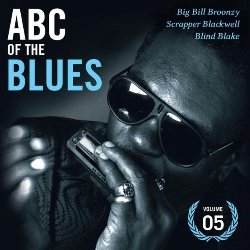ABC of the Blues CD5 (2010)
ABC of the Blues CD5 (2010)

CD5 - Big Bill Broonzy & Blind Blake 01 Big Bill Broonzy – Mississippi River Blues 02 Big Bill Broonzy – Long Tall Mama 03 Big Bill Broonzy – Worrying You Off My Mind (Part 1) 04 Big Bill Broonzy – Rising Sun Shine On 05 Big Bill Broonzy – Come Home Early 06 Big Bill Broonzy – Good Jelly 07 Big Bill Broonzy – Bull Cow Blues 08 Big Bill Broonzy – I Can’t Make You Satisfied 09 Big Bill Broonzy – How You Want It Done 10 Big Bill Broonzy – Hattie Blues play 11 Scrapper Blackwell – Kokomo Blues 12 Blind Blake – Come On Boys, Let’s Do That Messin’ Around 13 Blind Blake – Hard Pushin’ Papa 14 Blind Blake – Skeedle Loo Doo Blues 15 Blind Blake – Georgia Bound 16 Blind Blake – Too Tight Blues, No. 2 17 Blind Blake – Diddie Wah Diddie 18 Blind Blake – Southern Rag 19 Blind Blake – C.C. Pill Blues play 20 Blind Blake – Rope Stretching Blues, Pt. 1
Big Bill Broonzy (June 26, 1903 – August 15, 1958) was a prolific American blues singer, songwriter and guitarist. His career began in the 1920s when he played country blues to mostly black audiences. Through the ‘30s and ‘40s he successfully navigated a transition in style to a more urban blues sound popular with white audiences. In the 1950s a return to his traditional folk-blues roots made him one of the leading figures of the emerging American folk music revival and an international star. His long and varied career marks him as one of the key figures in the development of blues music in the 20th century.
Broonzy copyrighted more than 300 songs during his lifetime, including both adaptations of traditional folk songs and original blues songs. As a blues composer, he was unique in that his compositions reflected the many vantage points of his rural-to-urban experiences.
Broonzy's own influences included the folk music, spirituals, work songs, ragtime music, hokum and country blues he heard growing up, and the styles of his contemporaries, including Jimmie Rodgers, Blind Blake, Son House, and Blind Lemon Jefferson. Broonzy combined all these influences into his own style of the blues that foreshadowed the post-war Chicago blues sound, later refined and popularized by artists such as Muddy Waters and Willie Dixon.
Although he had been a pioneer of the Chicago blues style and had employed electric instruments as early as 1942, his new, white audiences wanted to hear him playing his earliest songs accompanied only by his own acoustic guitar, since this was considered to be more "authentic".
"Blind" Blake (born Arthur Blake; 1896 – December 1, 1934, Milwaukee, Wisconsin) was an American blues and ragtime singer and guitarist.
His first recordings were made in 1926 and his records sold very well. His first solo record was "Early Morning Blues" with "West Coast Blues" on the B-side. Both are considered excellent examples of his ragtime-based guitar style and are prototypes for the burgeoning Piedmont blues. Blake made his last recordings in 1932, the end of his career aided by Paramount's bankruptcy. It is often said that the later recordings have much less sparkle. Stefan Grossman and Gayle Dean Wardlow think its possible that only one side of Blake's last record is actually by him. "Champagne Charlie Is My Name" does not actually sound like Blake's playing or singing. Allegedly, Blind Blake was drinking heavily in his final years. It is likely that this led to his early death at only 38 years old. The exact circumstances of his death are not known; Reverend Gary Davis said in an interview that he had heard Blake was killed by a streetcar.
Last Updated (Sunday, 22 January 2012 11:41)








